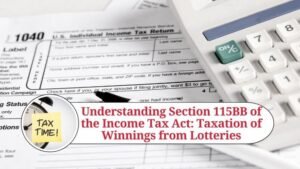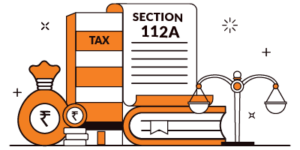In recent years, tax authorities around the world have increasingly focused on preventing tax avoidance through sophisticated transactions and schemes. One of the most important provisions introduced under the Indian tax laws to address this concern is Section 97 of the Income Tax Act, which deals with arrangements that lack commercial substance. This section forms a part of the broader General Anti-Avoidance Rules (GAAR), which empower tax authorities to disregard transactions whose sole or dominant purpose is to obtain a tax benefit.
In this blog, we will delve into the intricacies of Section 97, breaking down its provisions and explaining how it impacts taxpayers. By the end, you’ll have a clear understanding of what constitutes an arrangement lacking commercial substance and how to ensure that your transactions are compliant with the law.
What is Section 97 of the Income Tax Act?
Section 97 is aimed at identifying and dealing with tax avoidance schemes where the primary objective of a transaction or arrangement is to secure tax benefits without any real commercial purpose. Such arrangements are considered to lack commercial substance and can be challenged by the tax authorities under GAAR provisions. This section gives the tax department the right to disregard the tax benefits claimed by the taxpayer if the arrangement is deemed to lack genuine business intent.

Key Conditions for an Arrangement to Lack Commercial Substance
Section 97 lays down specific conditions under which an arrangement would be considered to lack commercial substance. These include:
1. Substance over Form
An arrangement is deemed to lack commercial substance if the substance or effect of the arrangement as a whole differs significantly from the form of its individual steps. In other words, if the legal structure of the transaction does not reflect its actual purpose or economic reality, it could be considered an arrangement designed solely to gain tax benefits.
For instance, if a series of complex transactions is entered into, but the overall effect of the arrangement is merely to shift profits to a low-tax jurisdiction without any real business purpose, the tax authorities may disregard the arrangement.
2. Involvement of Certain Elements
An arrangement would also lack commercial substance if it involves any of the following elements:
(a) Round Trip Financing:
This refers to situations where funds move in a circular flow and return to the original party in a manner that serves no commercial purpose other than to generate a tax benefit. For example, a company may borrow money from one subsidiary and lend it back to another subsidiary, with no real business purpose behind the transactions.
(b) Accommodating Party:
An arrangement involving an accommodating party is one where an unrelated party participates in the transaction for the sole purpose of enabling the primary participants to claim tax benefits. The accommodating party may not have any real economic stake in the transaction.
(c) Offset or Cancellation of Elements:
If the arrangement includes elements that offset or cancel each other out, it lacks substance. For example, a taxpayer may enter into a series of contracts that have no real effect on their business, but are designed to create artificial losses that can be used to offset taxable income.
(d) Disguising Transaction Characteristics:
Some arrangements are structured in a way that disguises the value, location, source, ownership, or control of funds. If a transaction is routed through multiple intermediaries or jurisdictions to hide the true nature of the transaction, it may be deemed to lack commercial substance.
3. Location Without Commercial Purpose
An arrangement may also lack commercial substance if the location of an asset, location of a transaction, or residence of a party is chosen without any real commercial purpose other than to obtain a tax benefit. For instance, a company may claim that its intellectual property is located in a tax haven even though it does not conduct any substantial business activity there. This type of arrangement is seen as having no substantial commercial purpose beyond reducing tax liabilities.
4. No Significant Impact on Business Risks or Cash Flows
If an arrangement does not have a significant effect on the business risks or net cash flows of any party involved, except for the tax benefits obtained, it could be considered to lack commercial substance. In such cases, the arrangement is viewed as having been entered into solely to achieve tax savings rather than to fulfill any genuine business need.
Practical Implications of Section 97
Section 97 acts as a safeguard against tax avoidance by allowing tax authorities to look beyond the legal structure of a transaction and focus on its economic substance. If a taxpayer’s arrangement is found to lack commercial substance, the tax benefits derived from it may be denied, and additional penalties could be imposed.
Here are some practical implications for taxpayers:
- Increased Scrutiny of Transactions:
Taxpayers must ensure that their transactions have a real business purpose beyond mere tax planning. Transactions designed solely to reduce tax liabilities are likely to attract the attention of tax authorities. - Proper Documentation:
Taxpayers should maintain proper documentation to support the commercial intent of their transactions. This includes business justifications for the arrangement and evidence of how it affects the taxpayer’s operations, cash flows, or business risks. - Risk of Penalties:
If an arrangement is found to lack commercial substance, not only will the tax benefits be disallowed, but the taxpayer could also face penalties under GAAR provisions. Therefore, it’s crucial to structure transactions in a way that aligns with both the letter and spirit of the law.
FAQs
1. What is round trip financing under Section 97 of the Income Tax Act?
Round trip financing refers to a situation where funds move in a loop, returning to the original party without serving any real commercial purpose, other than to achieve a tax benefit.
2. What is an accommodating party in the context of Section 97?
An accommodating party is an unrelated entity that participates in a transaction solely to help the main parties achieve tax benefits, without having any substantive role or economic interest in the transaction.
3. How can I ensure that my transaction does not lack commercial substance?
To ensure your transaction has commercial substance, it must have a genuine business purpose and significantly impact your business risks, cash flows, or operations. Proper documentation to support the intent is also essential.
Conclusion
Section 97 of the Income Tax Act plays a critical role in preventing tax avoidance by ensuring that only transactions with genuine commercial substance are eligible for tax benefits. Taxpayers must be mindful of the provisions of this section while structuring their arrangements and ensure that they have a clear business purpose behind each transaction.
For businesses and individuals alike, it’s important to seek professional advice to navigate the complex tax landscape and stay compliant with the law. If you’re unsure about the commercial substance of your transactions, consult a tax expert to avoid potential pitfalls under GAAR provisions.
For more insights into tax laws and compliance, visit our website: Smart Tax Saver.



